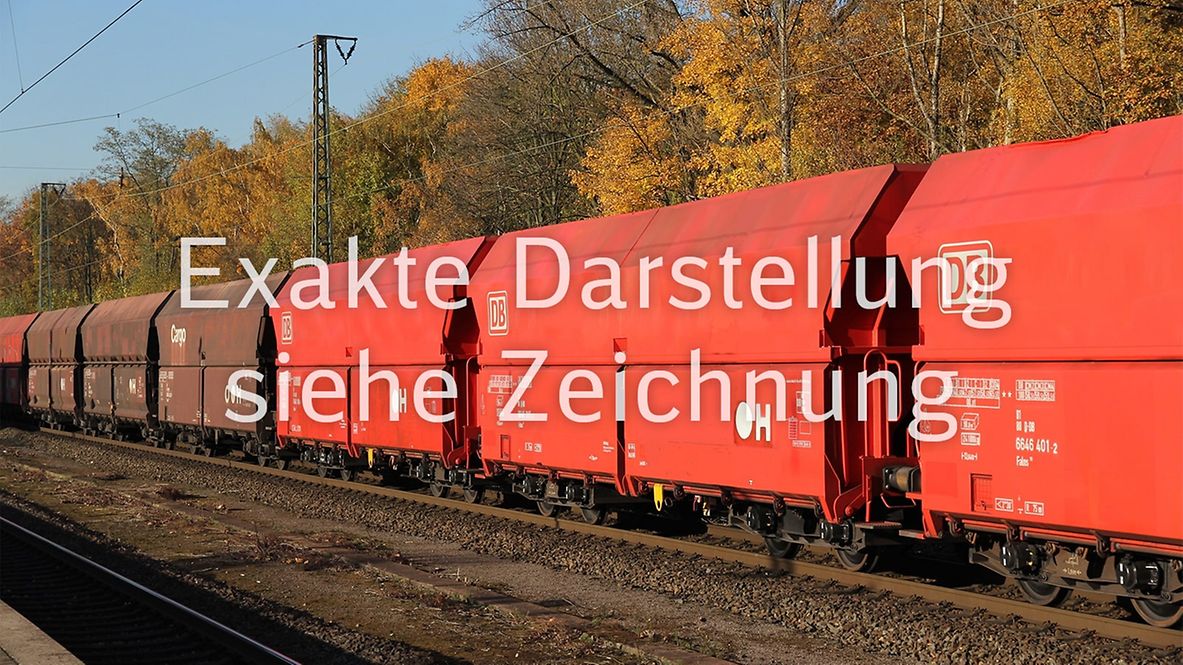Article: Faals 151
Open bulk freight wagons with bulk gravity unloading, hydraulic flap-closing system, automatic coupler and six wheelsets. Suitable for heavy bulk goods, especially iron ore. No international operability.
All four flaps are opened and closed simultaneously by actuating a control valve either from the wagon platform or from the bunker gantry using a special long-handled carriage key. In addition, the flaps opposite each other can be opened in pairs.
Please note: Type is similar to the wagon in the photo. For exact dimensions, please refer to the drawing and the data below.
Technical details
Loading space (m3) | 70.0 |
Inside width of hopper (mm) | 2,238 |
Inside length of hopper (mm) | 12,760 |
Average tare weight (kg) | 36,000 |
Maximum speed (km/h) | 120 |
International usability | No |
Smallest radius of curvature (m) | 75 (depending on load) |
First year of delivery or year of construction of the oldest wagons at this time | 1998 |
Parking brake | With and without parking brake |
Brake type | KE-GP-A |
Number of brake cylinders (pcs.) | 2 |
Brake cylinder diameter (mm) | 300 |
Type of load-proportional braking | Automatic |
Automatic coupler | UIC-AK 69e with crossbeam and sliding cradle suspension |
Distributor valve type | KE 2dSL-ALB/d53/1 |
Individual data
Side flap deflection – largest (mm) | 4,300 |
Maximum ramp angle when driving on ferries | 1°30' |
Length of discharge opening (mm) | 5,050 (per flap), 10,710 (total) |
Load limits
Tare weight > 35.5 t ≤ 35.0 t
With and without parking brake
A | B1 | B2 | C | D2 | D3 | D4 | ||
|---|---|---|---|---|---|---|---|---|
S | 40.0 t | 40.0 t | 52.0 t | 61.0 t | 61.0 t | 70.0 t | 70.0 t | |
120 |
DB | CE |
|---|---|
100 | 85.0 t |
Additional information:
The wagon is intended for transporting iron ore to an ironworks equipped with special unloading facilities (underground bunkers). However, it can also be used for transporting other bulk goods that do not need to be kept dry and that have high specific weights.
The wagon body consists of a saddle-shaped floor, end walls firmly connected to the underframe trusses, side walls, four discharge flaps hinged to the side walls and a transverse saddle that divides the wagon body into two equally sized compartments. The saddle angle is 49°. Between the solebars are the pivot bolsters, the beams for the air brake system and for the suspension of the main locking shafts, as well as the supporting structure for mounting the automatic coupler at both ends of the wagon. The material used for the body plates and pads is S355J2G3Cu, that for the solebars is QSt 380.
The flaps are opened and closed by a hydraulically powered camlock shaft closing mechanism. An indicator with a yellow signal background located in the middle of the wagon can be used to check whether the flaps are closed properly. It protrudes over the side wall if the flaps are not locked properly.
The pressurised oil is delivered by the wheelset pump in a hydraulic piston accumulator with a maximum operating pressure of 220 bar and a useful capacity of 20.6 litres against high-pressure nitrogen. The load condition is controlled by a path-dependent change-over unit in the accumulator, which switches the pump to unpressurised circulation when the accumulator is full. To actuate the flaps, the stored pressurised oil is fed via the manually actuated control valves to the two actuating cylinders, which are positioned in the middle of the wagon and each of which acts on a main locking shaft.
The pairs of flaps opposite each other can either be actuated separately or all flaps can be actuated simultaneously. The devices provided for this purpose, which are operated with a long-handled carriage key according to DIN 25255, are grouped together in a panel on the end wall at the platform-side end of the wagon. When the accumulator is unpressurised, a hand pump and corresponding operating levers allow the flaps to be actuated from the wagon platform in the event of an emergency.
The wagon is also equipped with a flap width adjustment mechanism, so the flaps can be opened to a restricted extent (max. 4,080 mm) or to their full extent (max. 4,300 mm). The corresponding switch lever is located underneath the panel and can also be operated with the carriage key.
Composite brake blocks (Becorit) deliver the required braking power.
All data provided without any guarantee of correctness or completeness.
